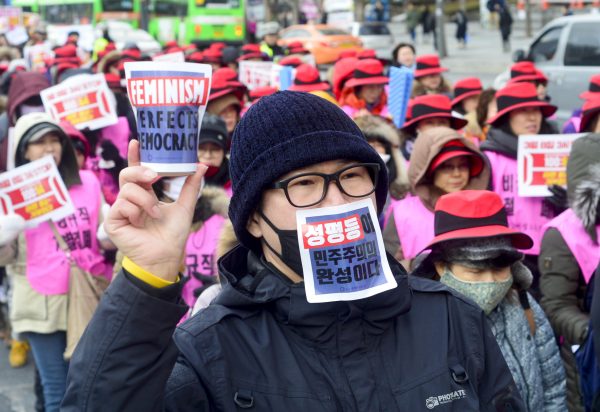The smear campaign against An is part of a ferocious anti-feminist backlash in the country. South Korea continues to score poorly in the World Economic Forum’s Gender Gap report, ranking 108 out of 153 countries. According to the same report, South Korea ranks 127 out of 153 countries in terms of economic participation and opportunity for women.
Despite being the world’s 10th largest economy, South Korea remains a male-dominated society with a substandard record of gender equality and women’s rights. The fuel for anti-feminist backlash partly lies with the historical and cultural dimensions of gender discrimination in South Korea. Current gender inequality stems from deep-rooted patriarchal ideologies and practices, most notably Confucian ideals. South Korea’s industrialisation exacerbated the clear division of labour, with the man as the breadwinner and the woman as a housewife. Now, pro-natalist policies and a push towards biased traditional practices attempt to solve a continuously declining birth rate problem.
Amid rapid social change and considerable internet use in South Korea, chauvinists are succeeding in demonising the feminist movement and promoting right-wing conservatism. South Korea’s competitive education system, high youth unemployment and disillusionment with compulsory military service have all contributed to the conservative swing.
After the Park Geun-hye debacle and defeat in the 2020 National Assembly election, the conservative People’s Power Party (PPP) rebranded. In the lead-up to the March 2022 presidential election, the PPP is seeking more political support by empowering younger politicians, creating a more inclusive candidate selection policy and, most notably, embracing the demonisation of feminism.
Youth unemployment rates in South Korea jumped from 6.9 per cent to 9.9 per cent in the last 10 years, making the competition for jobs more intense than ever. Men are pessimistic about the future and sense a loss of privilege as their place in society is challenged by economic instability. Government initiatives to bring more women into the workforce have also led to women now being viewed as competition. Some men believe that these measures give women an unfair advantage. Yet South Korean women still earn less than men and are poorly represented in government.
The PPP’s recognition of these concerns appeals to young male South Korean voters, leading to a large number making a sharp rightward turn. Around 73 per cent of Gen Z men voted conservative in the 2021 Seoul mayoral election and 76 per cent of them oppose feminism.
The solution to addressing gender inequality and economic instability lies in integrating more women into the workforce. Pushing for greater gender equality and female empowerment is also a step forward in strengthening South Korean democracy and legitimacy.
The economic gains that come from addressing gender inequality will address many of the country’s labour challenges. Failing to integrate women more equitably into the workforce only has negative implications for South Korea in the long term, especially given its rapidly aging population. Based on UN estimates, South Korea’s working-age population could decline by 7.5 million people by 2040. The resulting decline could push South Korea’s growth rate to as low as 1 per cent by 2030. The better integration of women into the workforce could see GDP growth of 7 per cent by 2035, roughly equivalent to what South Korea spends on healthcare.
Narrowing the gender gap should be a priority for South Korea if it wants to address old-age poverty and its lost GDP growth during the COVID-19 pandemic. More women in the workforce can lead to increased wages for all, generate more job opportunities and address South Korea’s rapidly aging population.
To prevent discrimination in the hiring process, South Korea could push toward a blind application process and increase fines on firms that utilise discriminatory hiring methods. South Korea must reform its Ministry of Gender Equality, which is frequently criticised for failing to protect women’s rights, and redefine its roles. The Ministry should focus on passing sustainable anti-discrimination laws, addressing the worsening pay gap and advocating for greater representation in government.
There are ways to hold the government accountable for progress toward its commitments to gender equality. South Korea can establish bilateral initiatives with the United States and Japan to hold each other accountable. The country can also establish trilateral initiatives with China and Japan, as Northeast Asia struggles with low birth rates and aging populations.
Gender inequality remains a pressing obstacle to regional growth in Asia. Advancing women’s equality in the Asia Pacific region could add US$4.5 trillion to their collective GDP in 2025 — the equivalent of adding an economy the combined size of Germany and Austria every year.
Kaylin Kim is an international relations and Asian studies student at Pomona College.


Equalize the military draft then talk about equality